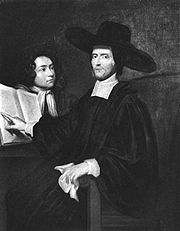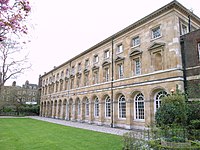
RICHARD BUSBY (16o6-1695)
Modern perceptions of the classical education available at the famous English Public schools of Eton and Harrow owe a lot to how those places evolved and established systems of education in the 19th and early 20th centuries. Yet one man above all can be argued to have done the most to influence the way that education at these establishments would evolve and he lived not in the 19th but the 17th century.
Richard Busby was an English clergyman, who went onto become headmaster of Westminster school. He was Born at Lutton in Lincolnshire in 1606 . He was actually educated at Westminster School himself and gained a King’s Scholarship – a mark of achievment and also funding for his education coming from a gift from the crown.
Busby went from Westminster to study at Oxford, where he was a graduate of Christ Church. He left the university in 1628 . Busby was an ardent supporter of the Stuart dynasty and the crown and and by the age of 33 he was rewarded for his services with the rectory of Cudworth in Somerset . He did not stay there long however because the next year saw him becoming head master of Westminster at a very young age.

- Westminster school today
He set about reforming the school, He wrote and edited many works for the use of his scholars the best of which are his Greek and Latin grammars. He expected high standards and enforced his rules with iron discipline . Corporal punishment with a cane was a frequent part of this discipline and he himself once boasted that no fewer than sixteen of the current bishops had been birched with his ” little rod.”
One could argue (with modern eyes) against the severity of his regime BUT one cannot argue with the results. No other school in England at any point in its history produced so many famous and significant men as Westminster did when Busby was headmaster there. The poet John Dryden, philosopher John Locke, scientist Robert Hooke composer Henry Purcell and architect Christopher Wren were all pupils at the school.
As I have said, Busby was a staunch royalist and yet was able to remain in his post throughout the years of the English Civil War despite London being a parliamentarian stronghold through the war. He prayed publicly for the safety of the Crown, on the very day of Charles I’s execution but he thrashed Royalist and Puritan boys alike without fear or favour. Busby also took part in Oliver Cromwell’s funeral procession.
So, Busby remained in office throughout the Civil War and the Commonwealth, when the school was governed by Parliamentary Commissioners, and well into the Restoration.
Busby died in 1695, in his ninetieth year, and was buried in WestminsterAbbey .
In my book The Last Seal I portray Busby as many of his pupils remembered and wrote about him: prone to severe tempers and using corporal punishement at whim. He can come across as rather a 19th century public school headmaster but that is because public schools in the 18th centuy onwards owed so much to his approaches to education via rigourous disciplined teaching styles.
There is saying that the battle of Waterloo was won on the playing fields of Eton. Perhaps it should have been the play fields of Westminster.
For more on 17th Century London watch my Blog and read The Last Seal: you can read the first part at http://www.richarddenning.co.uk/thelastseal.html


Related Articles
No user responded in this post